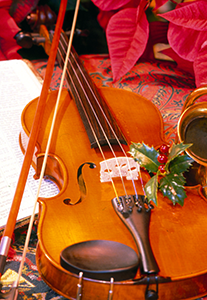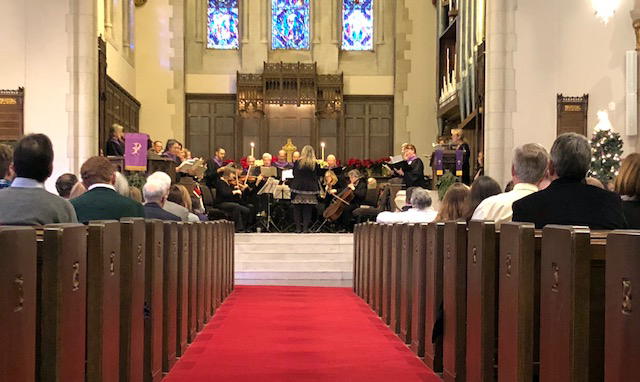-
A Festival of Lessons & Carols: Schubert’s Magnigicat in C Major
- Posted on December 5, 2019
- by Nancy
- in Ministries/Task Force News, Spire link, Worship
- Comments Off on A Festival of Lessons & Carols: Schubert’s Magnigicat in C Major
 Sunday, December 15, 2019, 10 AM
Sunday, December 15, 2019, 10 AMMagnificat in C Major, D 486, Franz Schubert (1797-1828)
Please join us on Sunday, December 15 at 10:00 AM for First Congregational Church’s annual Festival of Lessons and Carols, a beloved tradition from England wherein God’s word is proclaimed and contemplated in a special sequence of readings, prayers, choral anthems and congregational carols and hymns.
The Festival of Nine Lessons and Carols is most affectionately connected to King’s College in Cambridge, England, where it has graced the Chapel on Christmas Eve since 1918. The service was first broadcast in 1928 and, with the exception of 1930, has been broadcast annually, even during the Second World War, when the ancient glass (and also all heat) had been removed from the Chapel. Sometime in the early 1930’s the BBC began broadcasting the service on the World Service. It is estimated that today there are millions of listeners worldwide. It has since been adapted and used by churches and schools all over the world.
In the Festival of Nine Lessons and Carols, we weave together scripture, poetry and song, calling on readers and musicians from all ages and stages, and trace a spiritual progression that carries us from prophecy to fulfillment, from Old Testament foretelling to New Testament celebration of the birth of Christ.
As a part of this year’s Lessons and Carols, the Senior Choir will present Franz Schubert’s stirring and powerful Magnificat in C Major, D 486, written in 1816. A native of Vienna, Franz Schubert came from a musical family, and began violin and piano lessons at age eight. He studied music theory, piano, organ and singing with the choirmaster of his parish church and began composing at the same age, creating songs, string quartets, and piano works. When Schubert was a young boy, he auditioned for Antonio Salieri (Mozart’s supposed rival), the music director of the imperial court chapel. Salieri was impressed with the lad’s talents and recommended him as a singer. In 1808, Schubert passed the competitive audition for imperial court chapel and at the same time was admitted as a scholar to the Imperial and Royal City College. Music was a natural element of his life, and Schubert spent much time playing and composing while he was teaching full-time. Before he was 20, he composed an impressive number of works, including five symphonies, over 300 solo songs, part songs, masses, string quartets, and opera. In 1815 alone, the eighteen-year-old youth composed 140 songs, eight in one day! Two of his most famous and profound songs, Gretchen at the Spinning Wheel and Die Erlkönig (The Elf-King) were composed when he was 17 and 18 years old respectively. Franz Schubert was a gifted lyrical composer with an exquisite sense of melody and drama.
In 1822, Schubert quit his teaching and became a full-time composer, supported by friends who admired his ability. Many of those friends would regularly gather with Schubert for evening concerts of his vocal and chamber music. These gatherings, which became known as Schubertiade, were indicative of music becoming available to the educated middle class. Sadly, very little of Schubert’s music was published during his lifetime. His creative life was cut tragically short by illness, and he died in 1828 at age 31.
 Magnificat in C was composed during the fall of 1816, over a period of ten days (although it was not published until 1888), when Schubert was 19 years old. It was most likely written for the Christmas Vespers service in Lichtental. Its style demonstrates Schubert’s familiarity and facility with the Baroque-Classical traditions he was studying, while also hinting of the Romantic aesthetic he would go on to personify. It was Schubert’s only Magnificat. Although rarely performed, his miniature composition sparkles with possibilities and excitement. Structurally, the Magnificat in C is in three distinct movements forming a triptych, musically and dramatically. The first movement, Allegro maestoso, for chorus and orchestra is constructed on two musical ideas: a chorale-like theme and an imitative section to contrast texturally with the first. Schubert’s unparalleled gift as a lyric composer is evident in the Andante second movement in F major which he scored for solo quartet. Here the soprano line dominates the quartet writing with the lower voices reinforcing the melodic contours and frequent excursions into foreign keys.
Magnificat in C was composed during the fall of 1816, over a period of ten days (although it was not published until 1888), when Schubert was 19 years old. It was most likely written for the Christmas Vespers service in Lichtental. Its style demonstrates Schubert’s familiarity and facility with the Baroque-Classical traditions he was studying, while also hinting of the Romantic aesthetic he would go on to personify. It was Schubert’s only Magnificat. Although rarely performed, his miniature composition sparkles with possibilities and excitement. Structurally, the Magnificat in C is in three distinct movements forming a triptych, musically and dramatically. The first movement, Allegro maestoso, for chorus and orchestra is constructed on two musical ideas: a chorale-like theme and an imitative section to contrast texturally with the first. Schubert’s unparalleled gift as a lyric composer is evident in the Andante second movement in F major which he scored for solo quartet. Here the soprano line dominates the quartet writing with the lower voices reinforcing the melodic contours and frequent excursions into foreign keys.For the finale Schubert wrote a concertante rondo structure for chorus, quartet and orchestra, not unlike the triple meter finales of Dona nobis pacem heard at the end of Haydn and Mozart masses. The mood is of a joyful hymn and is heard in three different yet complimentary thematic sections. A festive set of Amens brings this happy, affirmative work to an emphatic close.
With the FCCW Senior Choir, a string quartet and our own Jeffrey Mead at the organ, we will joyfully celebrate the season of Advent. We invite you to join us! If you would like to participate with us for this special event, please contact Jane Ring Frank, Minister of Music and Worship Arts.






